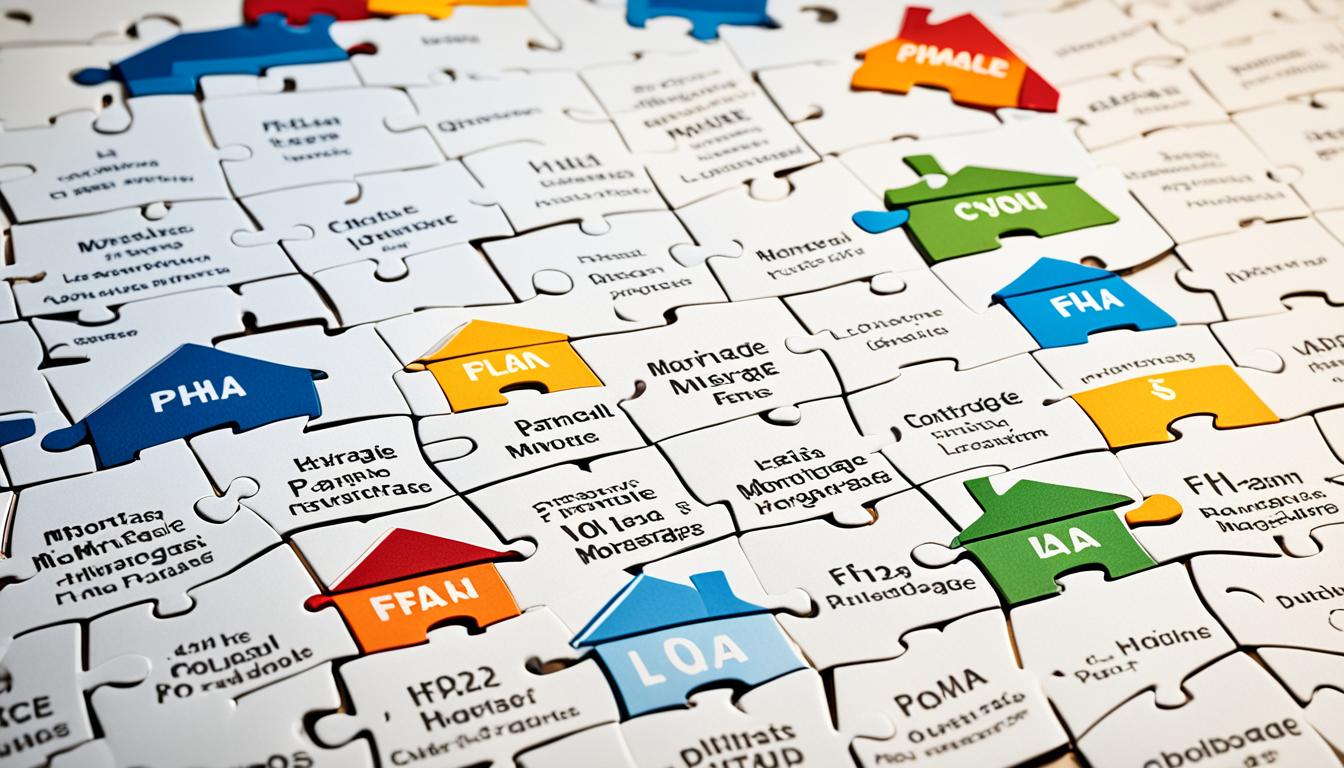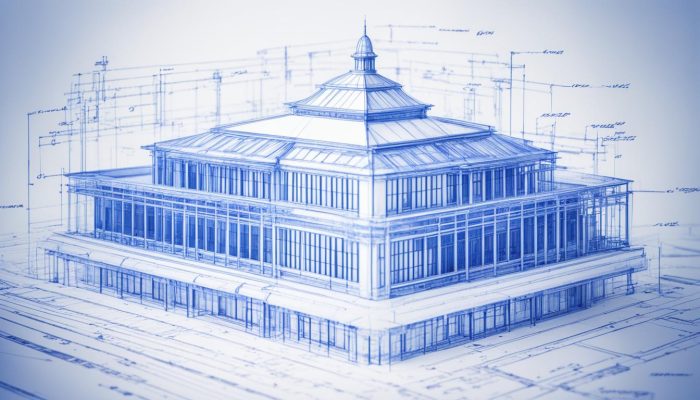Buying a home means looking at different mortgage options. Whether it’s your first home or you’re refinancing, picking the right loan is key. Let’s look at the various mortgage types and how to pick the best one for you.
Key Takeaways:
- Understanding the various mortgage options is essential when buying a home.
- Choosing the right loan depends on your financial situation and goals.
- Consider factors such as interest rates, loan terms, and down payment requirements.
- Evaluate your credit score and debt-to-income ratio to determine your eligibility.
- Comparing mortgage options can help you find the most favorable terms and rates.
Understanding Different Mortgage Options
Financing your home purchase requires knowing the different mortgage options. Lenders offer various loan programs for different financial situations and preferences. Exploring these options helps you find the best fit for your needs.
Fixed-Rate Mortgages
A fixed-rate mortgage is a top choice for many homebuyers. The interest rate stays the same over the loan’s life, offering stability. These mortgages have terms of 15 or 30 years, fitting various budgets and goals. It’s great for those who like predictable monthly payments and want to avoid rate changes.
Adjustable-Rate Mortgages (ARMs)
Adjustable-rate mortgages (ARMs) are another option. ARMs have rates that can change over time. They start with a fixed rate for 5 to 7 years, then adjust based on the market. ARMs offer lower initial rates, making them appealing for those planning to sell or refinance soon.
Government-Backed Loans
Government-backed loans offer benefits and specific requirements. FHA and VA loans help those with lower credit scores or small down payments. FHA loans need lower credit scores, while VA loans are for military members, veterans, and their families.
Each mortgage option has its pros and cons, including different rates and down payment needs. Think about your financial situation, goals, and preferences when choosing.
For more info on mortgage options, check out this helpful resource. It offers insights into mortgage lending.
Learning about mortgage options helps you confidently go through the homebuying process. You can find the loan that fits your needs and financial situation.
Evaluating Your Financial Situation
Before picking a mortgage, it’s key to check your finances. This helps you see if you can afford your mortgage payments. A mortgage calculator can be a big help here.
A mortgage calculator lets you figure out your monthly payments. You just need to know the loan amount, interest rate, and how long the loan is for. This way, you can see how different mortgage options might affect your wallet.
Think about your income, monthly bills, and debts when using a mortgage calculator. These numbers, along with your mortgage payment, show if your payments fit your budget.
If you already have a mortgage, look into refinancing. Refinancing can get you a lower interest rate or change your loan terms. This might lower your monthly payments or help you pay off your mortgage quicker.
Ultimately, finding the right mortgage means picking one that fits your financial goals. Use mortgage calculators and look into refinancing to make smart choices for your home financing.
Expert Tip: Consider Your Future Goals
Think about your future when checking your finances. Are you planning to live in your home for a long time? Are there big changes coming up that could affect your money? These thoughts help you pick a mortgage that suits your current and future needs.
Comparing Mortgage Options
Understanding your finances is the first step in finding the right mortgage. It’s key to picking the best loan for your home and financial goals. By looking at different mortgage options, you can make a choice that fits your needs and wants.
Factors to Consider
When you’re comparing mortgages, think about these key points:
- Interest Rates: Look at the interest rates from various lenders. A small difference in rates can greatly affect your monthly payments and the loan’s total cost.
- Loan Terms: Check the loan terms, like the loan length and whether it’s fixed or adjustable-rate. Think about how these will impact your budget and financial stability.
- Closing Costs: Review the closing costs for each mortgage option. These can include origination fees, appraisal fees, and title insurance. Knowing these costs helps you budget better.
- Potential Penalties or Fees: Be aware of any penalties or fees, like prepayment penalties or late fees. Knowing these can prevent unexpected costs later.
Long-Term Financial Goals
Think about your long-term financial goals when comparing mortgages. Do you plan to live in your home for a long time? Do you want a loan that offers flexible repayment? Consider how each mortgage fits with your future goals and pick the option that offers the most benefits.
Getting pre-approval from several lenders is a smart move. It gives you loan estimates from different sources, helping you find the best terms and rates. Pre-approval also gives you an edge when negotiating your loan.
By carefully comparing mortgage options, you can find the loan that suits your financial needs and helps you reach your homeownership dreams.
Benefits of Low Down Payment Mortgages
Low down payment mortgages help a lot, especially for first-time buyers or those with little savings. They cut the upfront cost needed to buy a home. This lets people become homeowners faster and achieve their dream of owning a property. These mortgages are flexible and offer many benefits, making them popular among buyers.
1. Affordable Entry into Homeownership
Low down payment mortgages make buying a home easier. The usual 20% down payment can be a big hurdle. But with these mortgages, buyers can start with less money upfront. This is great for those renting or facing high rent increases.
2. Conserve Savings
Choosing a low down payment mortgage helps save money. You won’t use up all your savings right away. You can keep money for things like furniture, moving costs, or unexpected repairs. This gives homeowners peace of mind and financial flexibility.
3. Faster Homeownership
Low down payment mortgages let you own a home sooner. This is great for those eager to settle in a certain area or take advantage of low interest rates. It’s a quicker way to reach your homeownership goal.
4. Potential for Appreciation
Buying a home with a lower down payment means you could see its value go up. As the home’s value increases, you build equity. You might sell it for a profit later, making it a smart investment in growing real estate markets.
5. Variety of Loan Programs
There are different types of low down payment mortgages, like FHA, VA, and conventional loans with lower down payments. Each has its own rules, down payment amounts, and terms. This lets buyers pick the mortgage that fits their finances and needs best.
But, low down payment mortgages also have some downsides. Some might have higher interest rates or require private mortgage insurance (PMI) if the down payment is under 20%. Buyers should look at all costs and terms before deciding.
In conclusion, low down payment mortgages offer many benefits. They make buying a home affordable, help save money, allow for quicker homeownership, offer chances for property value growth, and provide various loan options. When looking at these mortgages, it’s important to weigh the pros and cons. Choose the option that fits your financial situation and goals best.
Conclusion
Finding the right mortgage for your home is a big decision. It’s important to look at all your options carefully. This way, you can pick a mortgage that fits your money situation, goals, and what you like.
Start by looking into different mortgage loans and their terms. Think about things like interest rates, how long you’ll pay back the loan, and any extra fees. This helps you see which mortgage is best for you.
It’s also key to compare mortgage lenders to get the best deal. Get quotes from several lenders and look at their reputation, customer reviews, and service quality. This helps you find a lender that’s right for you.
By thinking about your finances, looking at your options, and comparing lenders, you can pick the best mortgage for your home. Doing this can save you money and give you a good loan that supports your financial health.
FAQ
What are the different types of mortgage options?
There are many mortgage options available. These include fixed-rate mortgages, adjustable-rate mortgages (ARMs), and government-backed loans like FHA or VA loans. Each type has its own pros and cons.
How do I evaluate my financial situation when choosing a mortgage option?
Use a mortgage calculator to figure out your monthly payments. This helps you see what you can afford. If you already have a mortgage, look into refinancing to match your financial goals.
What factors should I consider when comparing mortgage options?
Look at interest rates, loan terms, closing costs, and any fees. Also, think about your long-term financial plans.
Are low down payment mortgages a good choice?
Low down payment mortgages are great for first-time buyers or those with little savings. But, consider the higher interest rates or private mortgage insurance (PMI) costs.



